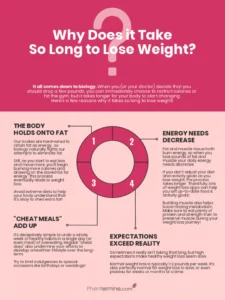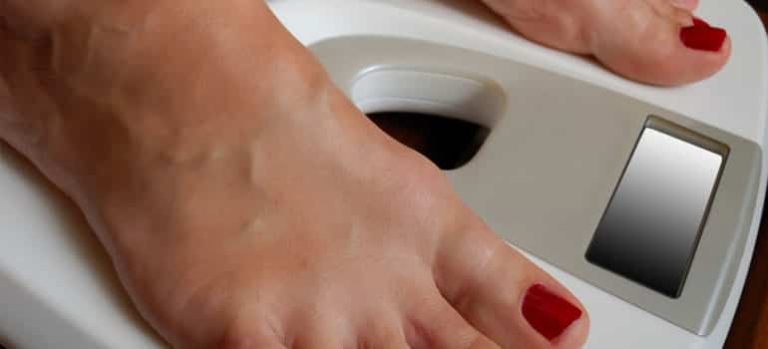Why Does it Take So Long to Lose Weight?
Do you ever feel like you’re not getting the weight loss results you want? Or that you deserve, given all of the time you spend eating healthy and working out?
When you put so much effort into slimming down, it’s incredibly frustrating to see little or no progress on the scale.
Unrealistic expectations promoted by magazines and social media just make it worse. So, why does it take so long to lose weight?
Despite all of the pressure we get from society to lose weight in the blink of an eye, gradual weight loss is the healthiest, and plateaus are entirely normal.
Here we’ll discuss why it takes so long to lose weight, plus give you some strategies to overcome common barriers.
4 Reasons Why Losing Weight Takes Time
So, why does it take so long to lose weight? It all comes down to biology.
When you (or your doctor) decide to drop a few pounds, you can immediately choose to restrict calories or hit the gym, but it takes a little longer for your body to start changing.
Since our bodies are built to survive, the standard operating procedure is to hold onto fat as energy stores. This makes it very hard to lose a dramatic amount of weight in a short period of time – and even harder to keep it off!
Here’s a little explanation of some common reasons why it takes so long to lose weight.
1. The body holds onto fat
It’s a frustrating reality for dieters and figure-conscious people everywhere: our bodies naturally retain fat as energy.
Thousands of years ago, this was a critical ability to ensure survival.
When you’re not sure when you’ll eat again, and extended famine is the norm, the ability to store fat as extra energy ensures health even when food stores are low.
However, in modern life, excess food supply – as opposed to famine – tends to present the more pressing issue. Our bodies still cling to fat as a survival tactic, but our current calorie-rich environment makes this quality more of a hazard than a benefit.
As of last year, over a third of American adults are obese, and another third fall into the overweight category.
So, why does weight loss take so long? Since our bodies are hard-wired to retain fat, biology fights our conscious attempts to eliminate extra fat.
As you start to eat less and move more, you begin drawing on this stored fat for energy. If you continue burning more calories than you consume, this will eventually lead to weight loss.
However, your body doesn’t want to eliminate its prized, saved-up energy. As a result, we don’t shed fat as quickly as we may like, and it’s absolutely normal to plateau.
Set Point Theory
This phenomenon of fat retention is sometimes discussed in connection with the set point theory.
Many experts propose that each person maintains an individual “set point” for weight, at which their body most likes to exist.
While it proves relatively easy to gain or lose about 10-20 pounds (4-9kg), our bodies undergo biological changes when we venture outside that pre-set range.
When weight decreases dramatically, metabolism slows, hunger increases and some people experience emotional changes to slow weight loss.
This is why many people reach a point where they feel like they just can’t lose any more weight. Thankfully, it may be possible to “reset” your set point over time.
How to Lose Weight Faster
Don’t go to extremes with weight loss.
When you eat fewer than 1200 calories per day (or 1500 if you’re a man) you risk triggering a starvation response in your body.
If your body interprets a lack of caloric resources, it doubles down on its efforts to retain fat stores. This is the exact opposite of what you want when trying hard to lose weight.
Over-exercising can also have the same effect. So, to keep your body feeling secure and maximize sustainable weight loss, avoid going to extremes on phentermine.
Unless otherwise instructed by your doctor, aim for a daily calorie deficit of about 500-1000 calories to lose a steady 1-2 pounds per week.
For a moderately active woman who burns around 1800 calories daily, this would mean a goal of 1200-1300 calories per day.
You can healthfully achieve this deficit through eating a portion-controlled diet and exercising most days, both of which are great habits to sustain over the long term!
2. Energy needs to decrease
Another factor that gets in the way of rapid, prolonged weight loss is a natural metabolism slowdown. It takes more energy to power a bigger machine, so as you shrink, your energy needs.
Fat tissue and muscle tissue both burn energy, so when you lose pounds of fat and muscle, your daily energy needs decrease. We often describe this effect as a metabolism slowdown.
Why does this make weight loss take so long? Since your smaller self doesn’t need as much energy to power daily activities, it’s important to reassess energy (and macronutrient) requirements regularly.
If you don’t adjust your diet and activity goals as you lose weight, the process is slower because the calorie deficit you’re creating decreases over time. Thankfully, many weight loss apps automatically (and constantly) adjust estimated needs based on your current weight and objectives!
While the main goal is to shed extra fat, muscle mass decreases during weight loss. Since muscle is more metabolically active than fat, losing muscle mass dramatically affects daily energy needs more than losing pure fat.
Unfortunately, it’s impossible to target weight loss so that you only lose fat. You can, however, modify your diet and exercises to promote muscle maintenance and building.
How to Lose Weight Faster
To minimize plateaus and keep losing weight, support muscle repair and building by:
- Eating plenty of protein
- Strength training
Healthy foods with a lot of protein include lean meats (e.g., turkey or chicken breast), eggs, low- or non-fat dairy, unsalted/unsweetened nuts or nut butter, and soy products.
Try to consume around 0.8 grams of protein per kilogram of body weight per day, or even slightly more if you’re highly active and at a close-to-healthy weight. For example, the average person who weighs 200 lb (91 kg) should aim for a little over 70g of protein per day.
Incorporating strength training into your workout routine is also beneficial for immediate and long-term weight loss.
Since muscle burns more calories at rest than fat, building muscle mass – or trying to maintain it during a period of weight loss – helps boost the metabolism.
Experts recommend including aerobic (cardio), strength training, balance, and flexibility exercises in your regular fitness routine.
Strength-building activities include lifting weights, completing resistance training or bodyweight exercises (e.g., push-ups or plank), or climbing stairs.
3. “Cheat meals” add up
Have you ever tried one of those weight loss plans where you diet for five or six days and then have a day or two “off”? Or do you take your phentermine only on weekdays?
These again-off-again diets are understandably popular, but for many people, the part-time schedule proves too good to be true. The logic is that if you create a big enough calorie deficit during the week, it’s okay to let up on the weekend and eat whatever you want.
Unfortunately, there are two big problems with this plan:
It’s too easy to undo all your hard work
If you diet all week and burn more energy than you consume, the weight should start to come off. Sadly, it’s deceptively simple to accidentally undo a whole week of healthy habits in a single day of junk food and overeating. If you subscribe to the “calories in, calories out” philosophy, weight loss is all about math.
So, overeating – even if it’s just for one day a week – can slow weight loss efforts.
That being said, there is absolutely a time and place for indulgence. Birthdays, graduations, weddings, and holidays are perfect times to enjoy a “cheat day” (or meal).
Partaking in fun, celebratory food is a big part of what makes festivities feel special, so go for it! Just make sure these less-than-healthy meals are something you enjoy on special occasions – not every day, nigh,t or week.
Healthy lifestyle > short-term diet
More than the risk of undoing your last week’s work, the idea of regular “cheat days” is problematic because it furthers the mindset of being on a diet that you’ll eventually stop.
Research repeatedly shows that the key to long-term weight loss is sustainable, healthy habits. So, if your diet involves constantly returning to old habits (and viewing healthy eating as a chore), this practice can be detrimental to permanent weight loss.
How to Lose Weight Faster
Work on making healthy choices the norm and consider treats as something you enjoy only on special occasions (like your birthday!). It’s best to consider why you want to lose weight and get fit, besides the number on the scale, as motivation to adopt this new lifestyle & mindset.
While it may be hard initially, you will reap the rewards in the long run. When a craving strikes, try to focus on how good you feel when you nourish your body with healthy food in moderate portions.
It’s also easier to make this shift if you don’t go to extremes. After all, there’s a big difference between telling yourself you’ll never eat any sweets again versus limiting your indulgence to a small treat just a couple of times per week!
4. Expectations exceed reality
Oftentimes, when you start a new diet or exercise program, you’ll experience rapid weight loss in the first couple of weeks.
It’s wonderful to see the scale move so dramatically at first, but many people get discouraged when weight loss soon slows. The good news is this is perfectly normal! Here’s why:
That initial weight loss is mainly due to losing water with glycogen.
When you first start cutting calories and/or upping your exercise, the most available source of stored energy comes in the form of glycogen. Instead of drawing on the fat stored all over our body, it’s easier to use the readily available energy from glycogen – a carbohydrate stored in the liver and muscles.
Since glycogen contains water, it releases much water when it is burned for energy. For this reason, some people lose a lot of water weight in the first couple weeks of their diet. Eventually, however, your body switches to other sources of energy (e.g., stored fat) for fuel, and this rapid weight loss ceases.
So, why does it take so long to lose weight? Sometimes, it doesn’t take that long, but high expectations make healthy weight loss seem slow. If you’re expecting this rapid drop to continue, either of your own accord or due to what you’ve seen online, that’s typically not realistic.
How to Lose Weight Faster
You can’t trick your body into burning glycogen forever – and you wouldn’t want to! If you’re putting in all of this effort to lose weight, you want your body to start drawing on its stored fat for energy so that extra weight eventually disappears.
In the meantime, try to embrace that it’s perfectly normal for weight loss to slow or even plateau for weeks or months.
If your weight loss slows or plateaus, try:
- Cutting calories (if you can do so and still stay above 1200 per day)
- Increasing activity (either at the gym or in your daily life)
- Assessing whether there’s any other habit contributing to your slowed weight loss (e.g., lack of sleep or poor meal planning)
Just remember: it’s normal to plateau! Don’t let a few days, weeks, or months at the same weight discourage you from continuing your long-term weight loss journey.
What do you think: why does it take so long to lose weight? Share your thoughts with us in the comments section below!
Did you like the article?
Subscribe to our weekly newsletter and get our best weight loss tips straight to your inbox!









